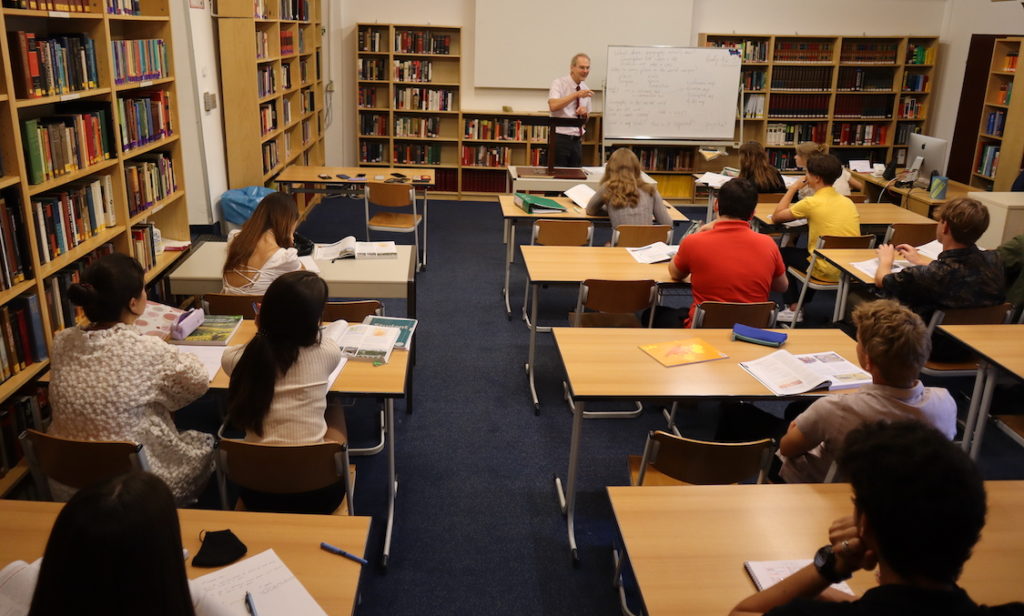
The social studies department plays a crucial role in promoting the educational beliefs of the American International School – Salzburg. The members of the social studies department recognize their roles as mediators between students and the world, attempting to inspire in students a genuine enthusiasm for learning to gain understanding of the global society in which they are an integral part. In an international school it is essential that we study the world’s rich and diverse cultures, both past and present, to recognize political, economic, and intellectual forces which continue to shape our society so that the modern world will not be crowded merely with haphazard events and media images, devoid of perspective and meaning. Heeding the ancient Greek call “Know Thyself”, we challenge our students to know the society in which they live and their responsibility to it.
The department attempts to integrate the various disciplines of social studies, history, geography, and economics, in an informal way. We include mapwork in history lessons, historical examples in economics, historical background in geography, and questions in civics in history. In addition, we strive to teach across the curriculum whenever appropriate and relate social studies to other disciplines such as literature, science, art, philosophy, and foreign language.
In our study of social studies we attempt to promote democratic principles and encourage students to consider the merits of democracy, the conditions which sustain it, and the conditions which weaken it and destroy it. Through discussion and group work in class students learn to cooperate and function within a community of learners and thus become better acquainted with democratic practices. By examining alternative political systems, we encourage students to consider the extent of which equality, human rights, dignity, and civic responsibility are possible in non-democratic systems.
In studying societies of the past and present, students are encouraged to view individuals and groups objectively and fairly, but at the same time critically. At no time should students begin to feel intellectually or morally superior or adopt a condescending attitude towards those who lived in the past or live in different societies today. Still, it is essential that students acquire the experience, ability, and confidence to judge and evaluate critically. History teaches us that where judgement is absent and indifference prevails, tyranny, persecutions, blind obedience to mass movements, and inhumanity thrive. Whether they become lawyers, craftsmen, doctors, teachers, or businessmen, they will be required to evaluate and judge. The study of social studies, as much or more than any other discipline, can teach students to evaluate with fairness, kindness, experience, and confidence – in short, with wisdom so that regardless of their role in society, they will act responsibly and nobly.
Students in World Geography will be introduced to the five main themes of geography, and understand why they are important and how they are to be put into use in everyday life. Particularly, students will be able to recognize telltale characteristics of climate zones and continents, the concept of a map, its parts, and how to read them, and the differences and similarities in cultures around the world. Minor objectives will include how information like population density is changing the modern world and the ability to connect historical places and figures together.
World History is a general required social studies course for students in the eighth grade. As a general survey of the world’s history, several themes related to the development of civilizations, major movements of peoples and cultures, and the economic, political, and social development of the Earth’s population are covered. Students will be introduced to the secondary-school level of historical study and will learn to review historical evidence and identify trends and major developments over time. Successful completion of the course should prepare students well for the following year course in World Cultures.
World Cultures is a general required social studies course for students in the ninth grade. This course will fundamentally prepare the students for upper-level history and geography studies. Major objectives of the course include the identification of the world’s major cultural regions, an understanding of the major accomplishments and achievements of the world’s ancient civilizations, an analysis of the various types of governments and economic systems that have developed over time, the identification and evaluation of common elements in various societies, both past and present, and an understanding of the different ways in which physical environment has affected culture.
This general course in American history presents a survey of the important and significant cultural, social, military, political, and economic events of the American people from the discovery of the New World to the present day. As such, it provides the high-school student with an overview of the significant and precedent-setting events and decisions which have guided and defined the nation’s history and present situation. The course is designed to be introductory and may be mastered by students who have never confronted the formal study of the United States as well as deepen the understanding of those students who may have taken an introductory American history or civics class at the junior-high or middle-school level.
Advanced-Placement Human Geography is a course which deals primarily with cultural features such as population, language, and urban patterns, as opposed to physical geography which deals with physical features, such as land forms, climate and soil. At AIS-Salzburg, AP Human Geography is taught over an entire school year, as it is a course we offer primarily to 10th and 11th grades whom we encourage to begin creating an AP profile for themselves. While a senior could easily meet the challenges of this AP Course in just one semester, we believe this would be too demanding for a 10th grader. Major objectives of the course include the understanding of the discipline of geography including its tools, themes, and concepts, the analysis and identification of the changing interconnections among places, and the ability to identify and explain patterns of population distribution, growth, and decline and relate each pattern to different stages of economic development. This course fully prepares students for the half-credit AP Human Geography Examination in May.
Advanced-Placement European History is a senior-level course at AIS-Salzburg which covers the dramatic events that have shaped Europe from approximately 1450 to the end of the Cold War. The course is designed to be the equivalent of a freshman college course in Western Civilization and includes intellectual and cultural history, political and diplomatic history, and social and economic history. In addition to providing a basic narrative of events and movements, the goals of the AP program in European History are to enable students (a) to develop an understanding of some of the principle themes in modern European History, (b) to analyze historical evidence, and (c) to analyze and express historical understanding in writing. This course provides full preparation for the AP European History Examination in May.
